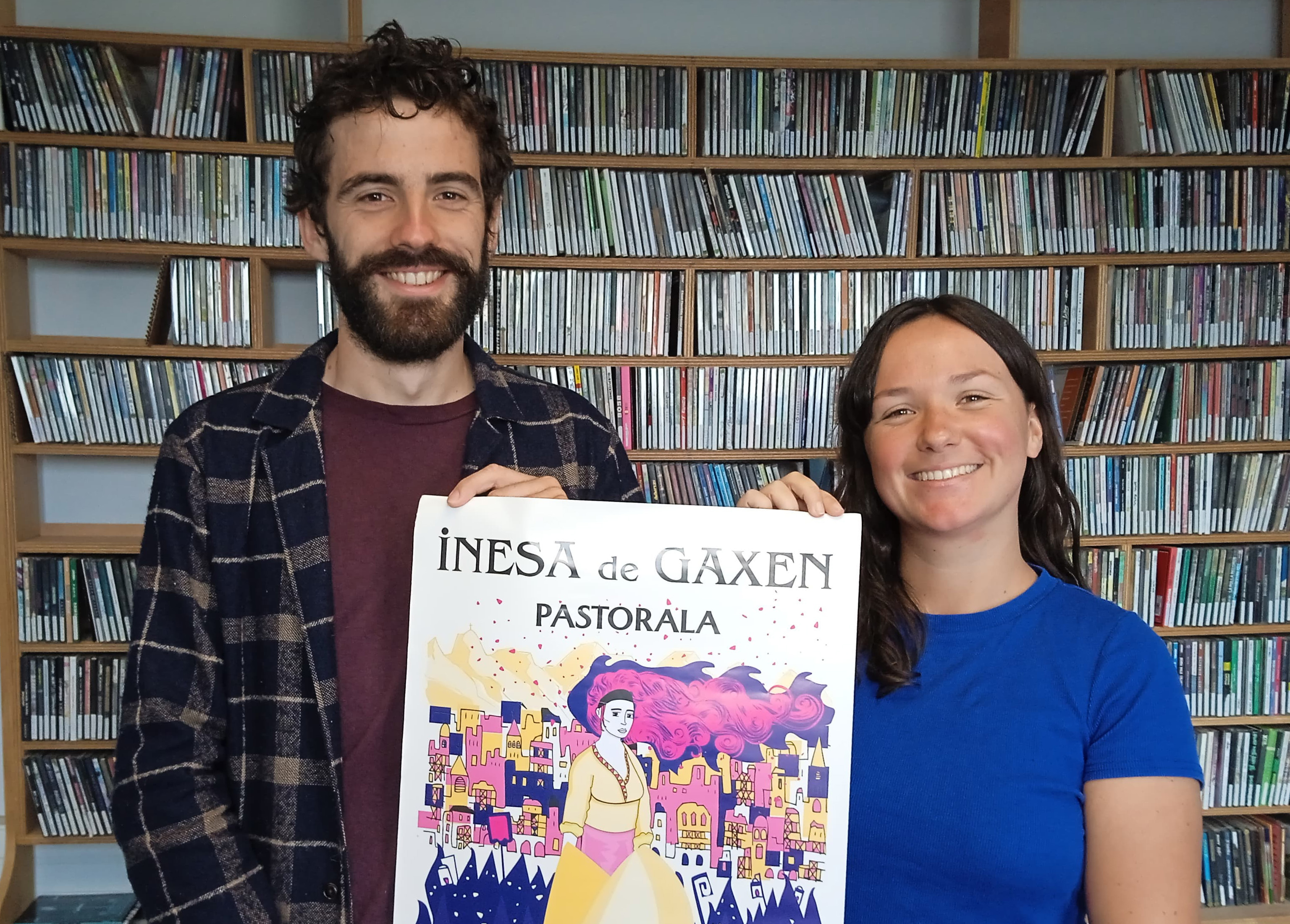Three men about the gender of the pastoral writer
- In 2017, Joana Etxarte wrote the pastoral ministry and most journalists asked why she had not chosen a woman as the main character, often replicating why male writers are not asked in the same way. That's what Hitza has done.

On 8 March, at a roundtable organized on the occasion of International Women’s Day, pastoral writer Joana Etxart compared the place of the dog and the wives before mentioning the cultural squares: “I can understand the dog’s place: in the lobby, in the butchery, at home […] I understand the dog’s place; but not the woman’s place.” The three men have answered questions about the prominence of women, their position in the front line or not, that is, about gender: Jean-Louis Davant, Dominika Rekalt Titika and Frantxoa Caset, writers of the pastoral Domingo Garat, to be held this summer.
For the three, in one way or another, the gender distinction observed in pastoral care is a reflection of society: “We have to participate in that evolution and ultimately recognize that wives are as many as we are, especially clearly. We have discarded it as a forgetfulness,” says Davant. Frantxoa Caset: “Before, the shepherds were more surrounded by men: now we see that women want to occupy the whole place, and I think it’s normal.” For Rekalt, this was the topic that prompted him to write the betrayal of the sorcerers in 2009: “It was a starting point for giving my wives or how to make them pass on Sunday, a witch story I had chosen from.” He took as a pastoral theme the processes against Pierre de Lancre and the witches.
Wives in history
According to Jean Louis Davant, in 1980 the first women of Urdiñarbe appeared on the stage, in 1990 the first türk. Those who had a main character or a wife, on the contrary, had often been in pastoralists. But at that time the lives of the saints were told. In Davant’s words, in history “it’s not easy to find wife süjet. Men have written history; in addition, women have had little space in public life until recently.” Therefore, he sees two outputs: “Look for it in recent history and not limit it to the Basque Country.” Without denouncing who has written it and what the subject is, a new pastoral writer that the people of Muskildi will give in 2021 will give an “example”: “The hero is a woman and not a Basque. And a close story, because that woman died a few years ago, well known.”
He has also joined the search outside Euskal Herria, with the name of the revolutionary anarchist Louise Michel, as an example. He also sees “another clue”: “If you want to catch a Basque woman, you have to scratch beyond the official history to find the protagonist wife.” There, he has taken as an example the Gudaris wives who have participated in the civil war of 36.
But Rekalt, the resource of pastoralists, is too limited: “Men who have made war or politics are often cited, and so far, women have been abandoned, so think throughout history. You have to scratch and scratch, and it's sure that if you line up, you notice."
On this year's poster, even though the main character is man, Caset says that his wives will be on the front line at some moments of jealousy or exits: An African woman, Claire Lacombe, Pauline Leon and Olympe de Gouge, on the one hand, fought against the use of slaves by the merchants of Bordeaux, and the sarana Maddalen Larralde, on the other. “They show their ideas by saying that wives really have a bad place in society: not voting, not going to school, not being able to take a trade… the priority was for men,” the author explained.
In another pastoral ministry he is writing, the pagolarra has chosen a wife as a süjet, clarifying that she has “that invented woman.” Davant also has another unpublished pastoral ministry, Blanca de Navarra: “I’ve been writing it for 34 years and I’ve made it known, but nobody asks me. The organizers also need the will to put their wife in the Süjet,” he says. Casetena was also one of this year’s proposals, but, as you know, the Pagolaris finally elected Domingo Garat.
Nuances for men
Caset himself, referring to the nuances of these wives he has wanted to put in “front line” in his writing, acknowledges that he may not have treated them as men; in the pastoral care, the characters – schematically good and bad Türk and Kiristis – enter through the red and blue doors in two groups. “I’ve put a lot of women in the good party. The truth is that I may not have given too much equality in that,” he says.
With reference to her different pastoralists, Davant attaches importance to the number of verses or coplas: “In my shepherds, my wife also appears as my husband’s partner, and I give her as much space as possible, even as many verses as possible, because it is the best way to mark the place in a pastoral. They are the bertsos that the actors give.”
For his part, the author of the Trajería de los Hechiceros does not classify the character by sex, in his own words: “If you were the wife of King Henry IV and, although you have not done much research on her, because the pastoral also has a personal fiction, I made the effort to give that woman a personality and a chain, as you give a man in the background. I see no difference in the way a man and a woman are treated.” By illustrating with examples, he puts Margaret Thatcher and Donald Trump on the same side, with a simple difference: “One of them will use a cunning machismo, but both are of the same profile.”
Female writers
Four women have made pastoral women public in recent years. According to Rekalt, “if man is blocked by his vision patriarkalean.Gizona freed from that patriarchal burden, instead, there is no difference between men and women, I don’t think so. It’s very personal: it’s not a gender story; it depends on everyone’s chain,” he says.
Davant did not take the same view: “I think women see things on their side and then they need time to really mark them. Three out of four handcuffs have put men on the süjet, as men do, which shows that it is not easy and that we are not talking about bad will or bad will. But we have to break our heads to get married again with süjet,” he said.
Gender roles are internalized, as Rekalt says, also in the actors: “Women attach more importance to garments. They've come with their loads and their clichés, they want to be elegant; man won't ask. There’s still a big change in society,” he says. The changes are necessary and the dance show composed by the newly released woman Topa Noka seems a good sign: “Five years ago, no one would think that wives would do it with each other.”
The group of singers Oilarrak will celebrate its 30 years with a pastoral ttipi of the priest Matalaz. In 2013, coinciding with the Xiru Festival, an action such as the pastoral Ederlezi, created by Mixel Etxekopar, will take place with song singers and musicians from the... [+]














